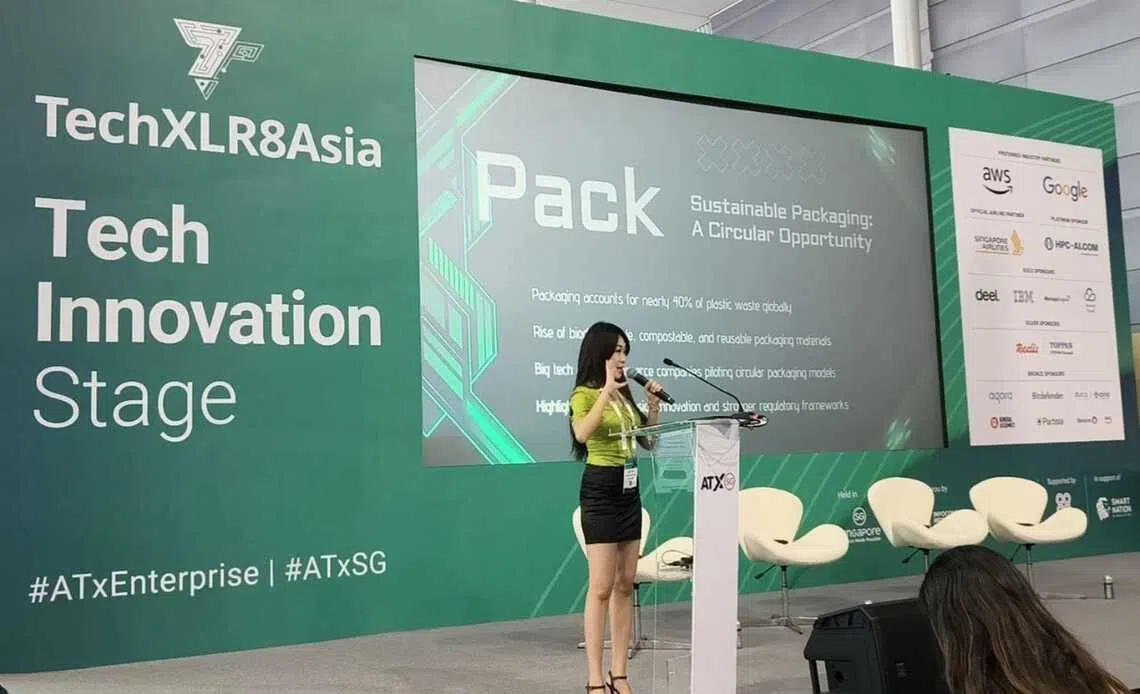Driving social impact through AI chatbots, sustainable packaging
Chat4Good taps AI to help with preliminary myopia screenings, while iGreen uses biodegradable alternatives to plastic packaging
[SINGAPORE] For years, OneSight EssilorLuxottica Foundation travelled to rural villages in Indonesia to conduct free eye tests, providing free or subsidised eyewear to those who needed it.
However, the process was tedious and incurred thousands of dollars in costs – staff were flown over from Singapore, and even lugged around clinical devices that test for myopia from village to village.
In 2023, to improve the process, the foundation partnered Chat4Good Technologies – a social enterprise specialising in artificial intelligence (AI)-driven conversational platforms for social impact.
Timothy Wee, founder and chief executive of Chat4Good, said: “(The process) became very expensive and wasn’t scalable… What we came up with was a WhatsApp chatbot that could do a preliminary myopia screening autonomously.”
This platform made screenings easily accessible for beneficiaries – anyone with a smartphone and Internet connection could do it.
“You talk to the WhatsApp chatbot, you hold the phone out at about arm’s length, and we can do a basic eye test for you without human intervention. From there, we can get a rough diagnosis of whether or not the user is likely to have myopia,” he added.
Navigate Asia in
a new global order
Get the insights delivered to your inbox.
If the user is at risk, the chatbot will ask for their location. Based on this, the user will be referred to the three nearest optical stores for follow-ups.
Wee said: “This helped to raise awareness of eye health in a region that otherwise believed that these conditions were incurable.”
It also enabled the foundation to cut costs and reach more beneficiaries, amplifying its impact.
The idea for Chat4Good came from a hackathon focused on social impact. Wee and his team realised that many organisations encountered challenges that could be tackled using AI.
He said: “We empower social impact organisations to scale their reach through AI. Many non-profits and social enterprises have limited budgets and technical expertise, depending on manual processes that can’t scale.”
Most of Chat4Good’s work so far has been in public health education, particularly in underserved communities, and has reached more than 2,000 people so far. Besides Indonesia, the social enterprise has projects in India and is looking to expand to Bangladesh and Mexico.
It is currently investing in its own infrastructure so it does not have to rely on cloud providers.
“This gives us complete control over data security and allows us to pass significant savings to our clients. This also means we can support our own digital philanthropic endeavours in the future at significantly reduced costs,” Wee added.
It hopes to provide free or subsidised AI resources to other social enterprises that cannot afford them.
Wee was one of 53 entrepreneurs recognised for their innovations and community spirit at the Spirit of Enterprise (SOE) Awards 2025, held on Monday (Oct 27).
Sivanessan Kitnasamy, SOE vice-president, said: “The idea of entrepreneurship is to produce value for the community – whether it is through work itself or the good causes that we can support through our work. I think that is the primary goal of any entrepreneur.”
Educating the community
Another honouree this year was Dr Kelly Tan, chief executive and founder of iGreen Go and Compostify by iGreen. Both Wee and Tan received the SOE Start-up Award.
iGreen, founded in 2021, is a sustainable packaging company that focuses on replacing traditional plastic packaging with biodegradable alternatives.
Tan said: “We design and manufacture food packaging solutions that reduce environmental impact and help businesses with global sustainability standards.”
The company also sells composting machines that break down its packaging, which offers a net-zero solution and creates a closed-loop ecosystem.

Beyond its products, iGreen engages with the community to drive sustainable efforts. Tan often speaks at events about this new technology and educates people about sustainability – from primary school students to business leaders. iGreen also sponsors food events and donates its packaging to food banks.
“iGreen is all about educating the next generation about composting, so that there is waste reduction and sustainable living,” she said.
So far, the company has helped to eliminate more than 20 million single-use plastic containers in circulation. It exports to places such as Australia and the Middle East, and its products are in operation in 12 markets.
iGreen plans to continue expanding around the world, particularly in Europe and Africa.
Decoding Asia newsletter: your guide to navigating Asia in a new global order. Sign up here to get Decoding Asia newsletter. Delivered to your inbox. Free.
Copyright SPH Media. All rights reserved.

